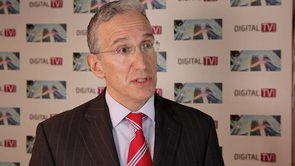
After more than 40 years of operation, DTVE is closing its doors and our website will no longer be updated daily. Thank you for all of your support.
Cable Congress: greater scale key for European cable
Creating greater scale either through horizontal mergers or by building out networks in greenfield areas remains the number one priority for European cable operators, according to a panel of senior executives at Cable Congress in Dublin.

Manuel Cubero
The completion of the integration of Kabel Deutschland into Vodafone had provided huge opportunities for the cable business, enabling it to offer bundled products, said Manuel Cubero, chief commercial officer, Vodafone Germany, participating in the panel.
Cubero said that offering a fixed-mobile bundle was key to the company’s growth strategy.
“From an industry perspective, [consolidation] makes a lot of sense,” he said, citing the example of the scale of operators in China, where there are fewer players than in some individual European markets.
Europe’s other major international cable operators, Liberty Global, is “busy building out” in the CEE region, adding half a million homes across the region last year. “We are not at [sufficient] scale in central and eastern Europe,” according to Robert Redeleanu, CEO of Liberty Global-owned UPC Romania and UPC Hungary, who described the region as “very fragmented”.
However, Redeleanu said that an absence of obvious consolidation opportunities meant that building out Liberty Global’s own network was a viable alternative strategy.
“While the opportunity of consolidating is still there, it is not so obvious and we are taking things in our own hands,” he said.
Building out new areas is a good way to deliver scale, he added.
“Scale is critical. With scale we could launch mobile and potentially pay for exclusive content and get the right efficiencies to launch new products,” he said.
Redeleanu said that Liberty was also looking to expand its mobile presence and launch mobile services across the region.
He said that Liberty had to “look at the payback” for infrastructure investment, but the case for investing in network build-outs was improving. While ARPU levels are lower than in western Europe, they vary across CEE, and ARPU has been growing across the region, he said. Liberty had been able to address premium segments of the market successfully, he said, and ARPU as a proportion of disposable income was high.
Consolidating the German market is “potentially an opportunity for us as a company” with strong penetration in housing associations, said Timm Degenhardt, CEO of German operator Tele Columbus, also participating in the panel. He said that Tele Columbus as a relatively smaller player could have opportunities in a consolidating industry.


